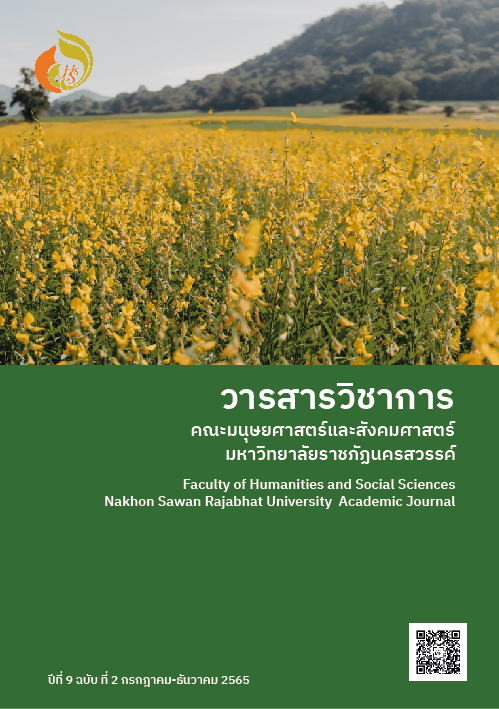สมรรถนะเชิงวัฒนธรรมของผู้เรียนชาวต่างประเทศที่มีต่อสมรรถนะภาษาไทย : กรณีศึกษาโครงการ Thai Immersion Program ณ สถาบันภาษาและกิจการต่างประเทศมหาวิทยาลัยราชภัฏเชียงราย
Main Article Content
บทคัดย่อ
บทความวิจัยเรื่อง สมรรถนะเชิงวัฒนธรรมของผู้เรียนชาวต่างประเทศที่มีต่อสมรรถนะภาษาไทย : กรณีศึกษาโครงการ Thai Immersion Program มีวัตถุประสงค์เพื่อ 1) ศึกษาสมรรถนะเชิงวัฒนธรรมของผู้เรียนโครงการ Thai Immersion Program 2) ศึกษาความสัมพันธ์ระหว่างสมรรถนะเชิงวัฒนธรรมและสมรรถนะภาษาไทย กลุ่มตัวอย่างที่ใช้ศึกษา ได้แก่ ผู้เข้าร่วมโครงการ Thai Immersion Program จำนวน 12 คน เครื่องมือวิจัย คือ แบบวัดสมรรถนะเชิงวัฒนธรรมและแบบวัดสมรรถนะภาษาไทยมาตรฐาน CRRU Thai – CEFR สถิติที่ใช้วิเคราะห์ข้อมูลได้แก่ ค่าร้อยละ ค่าเฉลี่ย และศึกษาความสัมพันธ์ด้วยการหาสัมประสิทธิ์สหสัมพันธ์แบบเพียร์สัน (Pearson's product moment correlation coefficient) ด้วยโปรแกรมสำเร็จรูป SPSS for Windows ในการวิเคราะห์ข้อมูล
ผลการวิจัยพบว่า หลังเข้าร่วมโครงการผู้เรียนมีสมรรถนะเชิงวัฒนธรรมเพิ่มขึ้นอย่างมีนัยสำคัญทางสถิติโดยมีค่าเฉลี่ยที่ 2.84 แปลความหมายได้ว่า ผู้เรียนมีสมรรถนะเชิงวัฒนธรรมเพิ่มขึ้นในระดับปานกลาง ซึ่งแสดงให้เห็นว่าโครงการอบรมดังกล่าวเป็นหลักสูตรอบรมภาษาและวัฒนธรรมระยะสั้นที่สามารถเสริมสร้างสมรรถนะเชิงวัฒนธรรมของผู้เรียนให้เพิ่มขึ้นได้ตามเป้าประสงค์ของหลักสูตร ในส่วนของความสัมพันธ์ระหว่างสมรรถนะเชิงวัฒนธรรมและสมรรถนะภาษาไทยพบว่ามีความสัมพันธ์กันเชิงบวกอย่างมีนัยสำคัญทางสถิติที่ระดับ .01 แปลความหมายได้ว่ามีค่าระดับความสัมพันธ์ในระดับสูง กล่าวคือเมื่อผู้เรียนมีสมรรถนะเชิงวัฒนธรรมสูงขึ้นจะส่งผลให้สมรรถนะภาษาไทยสูงขึ้นตามไปด้วย
Article Details

อนุญาตภายใต้เงื่อนไข Creative Commons Attribution-NonCommercial-NoDerivatives 4.0 International License.
เอกสารอ้างอิง
กมลชนก ชำนาญ. (2557). การพัฒนาแบบวัดและการวิเคราะห์ระดับความสามารถทางวัฒนธรรมของครู. วิทยานิพนธ์ปริญญาครุศาสตรมหาบัณฑิต. ไม่ได้ตีพิมพ์. จุฬาลงกรณ์มหาวิทยาลัย
ชุตินันท์ จันทรเสนานนท์.(2553). การพัฒนาแบบวัดสมรรถนะเชิงวัฒนธรรมสำหรับนักเรียน
มัธยมศึกษา. วิทยานิพนธ์ครุศาสตรดุษฎีบัณฑิต.ไม่ได้ตีพมพ์. จุฬาลงกรณ์มหาวิทยาลัย.
พระอุดมธีรคุณ, และบัณฑิกา จารุมา. (2563). ภาษาและวัฒนธรรม : ความหมาย ความสำคัญ และ
ความสัมพันธ์ระหว่างกัน. วารสารมหาจุฬาวิชาการ, 7(2), 53-63.
บุญศรี พรหมมาพันธุ์. (2561). เทคนิคการวิจัยทางสังคมศาสตร์. กรุงเทพมหานคร: บริษัทวังอักษร.
วาลี ขันธุวาร. (2550). การศึกษาความสัมพันธ์ระหว่างความรู้ทางวัฒนธรรมไทยกับผลสัมฤทธิ์ในการ
เรียนภาษาไทยในฐานะภาษาต่างประเทศ. Electronic Journal of Foreign Language Teaching Nus, 4(2), 235–256.
สุจิตรา โซ่พิมาย. (2559). การพัฒนาตัวบุ่งชี้สมรรถนะเชิงวัฒนธรรมของนักเรียนระดับชั้นมัธยมศึกษาตอนปลาย สังกัดสำนักงานเขตพื้นที่การศึกษามัธยมศึกษาเขต 20 (อุดรธานี). วิทยานิพนธ์การศึกษามหาบัณฑิต. ไม่ได้ตีพิมพ์. มหาวิทยาลัยมหาสารคาม.
อดิสรณ์ ประทุมถิ่น. (2563). Teacher’s Perceptions towards Authenticity and the Development of Learner Autonomy: Cases of Thai as a Foreign Language. วารสารมังรายสาร, 8(1), 87-104.
Byram, M. (1997). Culture studies and foreign language teaching. In S. Bassnett (Ed.), Studying British cultures: An introduction. London: Routledge.


